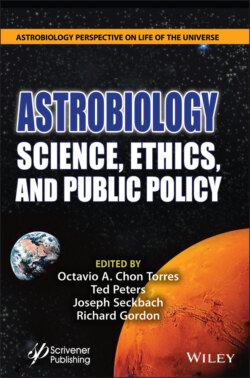Читать книгу Astrobiology - Группа авторов - Страница 14
1.1 Introduction
ОглавлениеFor a long time, humans have wondered if we are alone in the universe. This has manifested itself in culture, in religion, in philosophy, and in a variety of forms as different as human groups can be on Earth. Although we have not found empirical evidence that we are not alone in the cosmos, eventually this can happen. We do not know exactly when this will happen. However, that is not an impediment to the question of what we should morally do about it. Science and technology advance by leaps and bounds in the search for extraterrestrial life.
Every so often we see news about habitable exoplanets being detected. We have the disciplinary nature of Astrobiology, which brings together several disciplines made up of different specialists whose modus operandi is to work in an orchestrated and coordinated way. But what about the humanities, specifically ethics? Can we have a breakthrough that is matched with the Natural Sciences? To make the comparison would not do justice to either of them, since the nature of both respond to forms of knowledge with their own characteristics.
No. Ethics is not a science that gives us answers like mathematical formulas or experiments in a laboratory or astronomical observations. Ethics is a branch of philosophy that studies the moral dimension of human actions and thinking and, as such, since it does not have a unified methodology in which all experts agree and whose proposal is immutable in time, there are no universal moral laws. However, thanks to reflections on morality we can realize and reflect on our actions and thoughts, on their consequences and implications. That is why it is much more difficult to establish a moral system with coherence and adequate sustenance. And if that is so for earthly matters, for matters that go beyond life on Earth this could become a great mental exercise which will take time and the results of which will not be available every few months as if they were the product of the latest technological advances. To be able to engage in the thinking of astrobioethics, one must approach ethics as a branch of philosophy in addition to astrobiology, because astrobioethics was born in conjunction with moral reflection on issues expressly related to extraterrestrial life and, unlike astroethics, it deals with aspects that are more broad and general such as the responsibility of taking care of space junk or the right to property in an interplanetary context [1.6] [1.10] [1.11] [1.24].
The first time the word astrobioethics was used was in 2016 at two international events: the 35th International Geological Congress in Cape Town, South Africa [1.20] and the 12th Rencontres du Vietnam in Quy Nhon [1.21]. The first academic article that directly addressed this issue was published in the International Journal of Astrobiology under the title “Astrobioethics.” It states that
“Astrobioethics is an interdisciplinary field of astrobiology and ethics; it studies the ethical implications of astrobiological research. However, astrobioethics must have transdisciplinary practices in order to enrich itself and propose a broader judgement according to the context where it is applied [1.8].”
The concept of the scientific discipline of astrobiology should include a humanities perspective. In addition, three fundamental axes need to be analyzed in astrobioethics research, which are: the legal aspect, the ethical aspect, and the social aspect. One of the ideas reflected upon is the moral relevance of the Planetary Protection Policy and the need to make it more impactful on ethical discussions concerning any space exploration involving astrobiological components.
Currently, the Working Group on Astrobioethics, a working team belonging to the International Association for Geoethics led by Jesús Martínez-Frías, is the first official international working group on astrobioethics. “One of the main tasks of the WG will be to analyze the potential societal and ethical implications related to astrobiology…” [1.19]. Considering the above, this work is the first book that addresses the astrobiological theme from its ethical aspect.
Different issues will be presented below related to the astrobioethics discussion to determine its importance and opportunities for reflection from different starting points. All of these have to do with whether we are alone in the universe, but also with what would happen if a discovery of life in the universe happens. Here we will look at the discussion involving epistemological, astrotheological, and interplanetary aspects.
